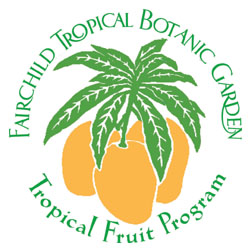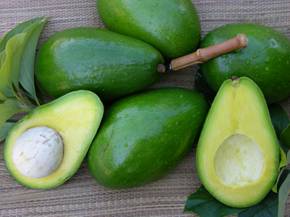
Avocado
Persea americana
The avocado (Persea americana ) is a large fruit tree to about 30 feet here in South Florida. It is evergreen with huge dark green leaves when properly fed. Native to the American Tropics, avocado grows in a dense, symmetrical form with leaves and branches growing to the ground when young. South Florida grows about 8 varieties commercially producing fruit varying from 14 to 40 ounces each. Popular varieties include Brodgon, Choquette, Hall, Lula, Marcus, Pumpkin, Monroe, Pollack, and Simmonds. There are actually three botanically distinct races of avocado: ones from the West Indies, from Mexico and from Guatemala. The West Indies race has a leathery skin, pliable, non-granular, and the flesh low in oil. The leaves are not aromatic.

Avocados should be harvested mature, however, determining the proper time to harvest can be difficult because the fruit change very little. Maturity standards have been determined by weight and time of the year for each cultivar. Homeowners usually harvest the entire crop when a few mature fruit have fallen. This is not a good guide because the flowering of the avocados results in fruits in varying stages of development on the tree at the same time. The best way to know when a fruit is ready to be harvested is the size of the fruit, the largest fruits, should be picked first. After harvest, let them ripen at room temperature 75° to 80° F (24° to 27° C). The fruit will ripen within 2-4 days; the skin yields to a gentle squeeze. At this stage, they are ready to eat or may be kept in the refrigerator for several days.
The avocado has been part of the human diet for thousands of years. Native to the tropics and sub-tropics, there are records of its usage 1ating from 7,000 B.C. in Mexico. There are three major types or races of avocados. The Mexican (grown in California) and Guatemalan types are relatively small-fruited compared to the Florida or West Indian types, which have very large fruit. Florida avocados are large, smooth-skinned fruits and are lower in calories and fat compared to Mexican and Guatemalan avocados.
“Four or five tortillas (corn cakes), an avocado, and a cup of coffee — this is a good meal,” proclaimed Wilson Popenoe, one of the foremost avocado explorers. He spent years in the wilds of Central America hunting for the best avocados, surviving on scarcely more than corn and avocado. Avocado is a very healthy fruit. They are low in calories, high in vitamin A, carotenoids and potassium, and contain no cholesterol. Avocados are full of fat, 30 grams per fruit, but it is monounsaturated fat that promotes HDL, the good cholesterol.
Avocados are delicious any way you slice them.